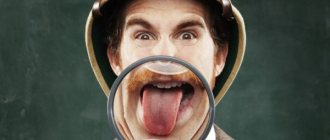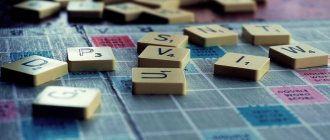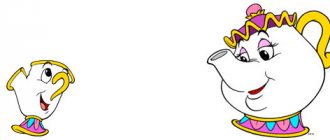A tongue twister is, as a rule, a short phrase or small text, which is a sentence or a set of sentences built according to the syntactic laws of a certain language, and which contains combinations of sounds that deliberately make it difficult to quickly pronounce words. The form of a tongue twister can be either rhymed (in verse) or non-rhymed.
Tongue twisters, also popularly called pure tongue twisters (sometimes even frequent tongue twisters) or tongue twisters, appeared in Rus' as a small folklore genre for children and adults. Since ancient times, “speaking quickly,” that is, quickly, clearly and correctly pronouncing the most complex combinations of sounds or long words, has been an exciting folk game in which the most skillful, dexterous and skillful speakers competed. Russian tongue twisters are complex; sometimes it is even difficult to simply pronounce some combinations, let alone pronounce a pure tongue twister at a fast pace, repeating it several times.
It is precisely these tongue twisters, which, when pronounced “you can break your tongue,” are an excellent exercise for developing diction and other vocal skills of oratory, which you can read about in the lesson on making a speech. And they are widely used not only by parents who want to improve their children’s diction and teach them to correctly pronounce the sounds of their native language, but also by professional actors, announcers, TV presenters, and politicians to develop speech pronunciation skills.
Tongue twisters are considered a very effective method of training the articulation of sounds, getting rid of tongue-tiedness, speech defects, and promoting the development of correct speech. You should train the pronunciation of tongue twisters in stages: to achieve the best effect, the tongue twister is first pronounced clearly and slowly, then gradually increasing the tempo and adjusting diction and articulation.
Quite tongue twisters are often classified according to different criteria; tongue twisters are usually distinguished as complex or difficult, long, special for diction, fast, folk, and so on. However, in this article, as part of the entire 4brain.ru course on public speaking, the classification will be built on the basis of sounds and combinations of sounds that are being trained. The choice of tongue twisters for speech development depends on the individual and the phonetic features of his diction. Pay attention to exactly those sounds and combinations of sounds whose pronunciation causes you difficulty. You can choose tongue twisters designed to train the sounds you need.
Tongue twisters with the sound "h"
[Ч] is a dull and soft sound that does not have paired voiced and hard sounds in the Russian language. At the moment of pronouncing this sound, the lips are slightly moved forward and rounded, and the teeth are brought together, but not completely. While the wide tip of the tongue is raised to the front of the hard palate near the base of the upper front teeth, air quickly passes into the resulting gap, with its push forming the sound [H]. Problems with pronouncing this sound are often associated with the so-called “lisp,” but it can be effectively combated. Here are examples of tongue twisters for practicing pronouncing the sound [H].
- The watchmaker, squinting his eye, is fixing the watch for us.
- We have golden chicks in our stove.
- Titmouse, titmouse - sister to the sparrow.
- The turtle, not bored, sits for an hour with a cup of tea.
- The eccentric is hiding a suitcase under the sofa.
And also a tongue twister in the form of a poem:
- A quarter of an hour
- Sang ditties on Plyushchikha.
- Black cat, big weirdo,
- I climbed into the attic to listen.
Russian folk tongue twisters
The scarlet cap is a hundred times more beautiful.
*** The birch bark basket is full of cloudberries. *** Senka is carrying Sanka and Sonya on a sled. Sledge jump, Senka off his feet, Sonya in the forehead, all in a snowdrift. *** Have fun, Savely, stir the hay. *** Wolves are prowling - looking for food. *** In the darkness, the crayfish make noise in a fight. *** Get up, Arkhip, the rooster is hoarse. *** In Polycarp’s pond there are three crucian carps and three carps. *** Rake - to row, broom - to sweep, oars - to carry, runners - to crawl. *** Evsey, Evsey, sift the flour, and if you sift the flour, bake some rolls in the oven and the swords will be hot on the table. *** Pussy eats soup from a bowl. The pussy is full, the bowl is empty. *** It’s terrible for a beetle to live on a bitch. *** Water flows from a nearby well all day long. *** Mow, scythe, while there is dew, away with the dew - and we are home. *** Grandma bought beads for Marusya. *** Goats climb into the vine during a thunderstorm - goats gnaw the vine during a thunderstorm. *** Baby hedgehogs got lost in the rye. *** You are welcome to our hut: I will crumble the pies and ask you to eat. *** On the river shallows we came across a burbot. *** Bast shoes, bast shoes. *** Senya carries hay in the canopy, Senya will sleep on the hay. *** Our Polkan fell into a trap. *** Slava Vlas ate all the lard. *** From the clatter of hooves, dust flies across the field, dust flies across the field from the clatter of hooves. *** The quail hid the quails from the guys. *** Seven of us sat in the sleigh ourselves. *** I went to weed the fields. *** The crow missed the little crow. *** There was lard, it became scarce, we ate the lard and it was gone. *** The fellow ate thirty-three pie pies, all with cottage cheese. *** The river flows, the stove bakes. *** To interpret clearly, but to misinterpret it to no avail. *** Kondrat’s jacket is a little short. *** Masha has poppies and daisies in her pocket. *** Senya and Sanya have a catfish with a mustache in their nets. *** It’s a hassle to catch a cunning magpie, but forty forty is forty hassle. *** Scales on a pike, bristles on a pig. *** Forty mice walked and six found pennies, and the worse mice found two pennies each. More than 50 more Russian folk tongue twisters...
Tongue twisters with the sound "sh"
[Ш] is a consonant, dull, hard sound. When pronouncing this sound, the following happens: the lips move forward, and the tip of the tongue is raised to the palate (closer to the front upper teeth), but does not touch them, forming a gap. The lateral edges of the tongue are pressed against the upper molars, not allowing a stream of exhaled air to pass along the sides, which forms the sound [Ш].
Here are several tongue twisters for developing the pronunciation of the sound [Ш], the first of which is probably the most popular tongue twister:
- Sasha walked along the highway and sucked on a dryer.
- Sasha accidentally hit a bump with his hat.
- Cuckoo bought a hood. The cuckoo put on a hood, he looks funny in a hood.
What is diction?
Diction is the name given to the clear pronunciation of sounds in accordance with the phonetic norms of the language. Expressive diction is the most important characteristic of acting, singers, and performers.
Clear diction depends on the level of training of the active organs of speech - such organs include the tongue and lips. In this regard, practicing expressive diction should begin with muscle training - articulatory gymnastics.
Diction shows how correctly a person pronounces words and syllables, how clearly he pronounces sounds - all this can be trained and improved.
Unclear pronunciation of words interferes with their correct perception, and a poorly pronounced phrase sometimes even loses its meaning. Distortion of sounds can greatly distract the attention of the audience, causing them to focus on defects in sound rather than on the meaning of the phrase spoken.
IMPORTANT: It is much easier for a person with expressive diction to interest and captivate the audience. It is much easier for such a person to speak in public.
Good speaker
Tongue twisters with the sound "sch"
Like [Ch], the sound [Ш] is dull and soft. In articulation, the sound [Ш] is very similar in pronunciation to its paired sound [Ш], the difference is that the hard palate should touch not the tip of the tongue, but its middle, while the tip itself is located at the upper front teeth. Here are four examples of pure phrases for practicing the sound [Ш]:
- Koshchei is not treated to cabbage soup.
- A predator is prowling in the grove - the predator is looking for food.
- The puppy is dragging a board into the thicket.
- I clean the puppy with a brush, tickling its sides.
And here is a combined tongue twister for training two sounds “sch” and “sh”:
- When we stir the grass in the grove, we will pinch the sorrel.
Tongue twisters about tongue twisters
The tongue twisters jump around like crucian carp in a frying pan.
*** Fast tongue twisters are agile with speed.© *** Forty forty, they said forty tongue twisters per lesson. Soon I have to say forty things in class again on time. © *** To speak quickly, you need to speak quickly. In order to quickly mutter, the talk of speed is to speed up. © *** Tongue twisters are spoken quickly. *** The tongue twister spoke quickly, the tongue twisters spoke quickly. *** You can’t talk through all the tongue twisters, you can’t talk them out again. *** The tongue twister quickly spoke quickly, That you can’t quickly pronounce all the tongue twisters. But, having quickly spoken, he quickly said that all tongue twisters can be spoken quickly, but not too quickly.
Tongue twisters for training "r"
The sound [R] is correctly pronounced like this: the tip of the tongue is raised to the palate, and the lateral edges are pressed against the upper molars. The air passes sharply through the middle of the tongue, causing it to vibrate at the alveoli (front upper teeth). Below are tongue twisters for practicing the sound [P] in combination with other sounds:
- There is grass in the yard, there is firewood on the grass, don’t cut wood on the grass in the yard!
- They cut an ice hole and caught fish.
- A Greek was driving across the river, he saw a Greek - there was cancer in the river. He stuck the Greek’s hand into the river, and grabbed the Greek’s hand.
- Karl stole corals from Clara, and Clara stole a clarinet from Karl.
Of course, there are many pure sayings for training pronunciation and other sounds, in addition, there are complicated and specific options: liguria, shibboleth and others. You can also use even an ordinary book for speaking quickly. However, all this is beyond the scope of this article, which is aimed at introducing tongue twisters for the development of speech and diction. If you are experiencing serious difficulties pronouncing certain sounds, then you should contact a specialist who will give you the correct pronunciation. Otherwise, you risk learning incorrect pronunciation, which will then be very difficult to correct.
What is the difference between a tongue twister and a tongue twister?
Initially there is no difference.
In Dahl's dictionary, a tongue twister is defined through a pure twister: “A tongue twister is a pure tongue twister, a type of folded speech, with the repetition and rearrangement of the same letters or syllables, which are confusing or difficult to pronounce.” Speak quickly - speak quickly, quickly.
Pure speech - speak clearly, without mistakes.
However, not so long ago a new genre appeared -
speech therapy pure tongues . Speech therapists needed exercises with many different combinations of difficult sounds, but there were no full-fledged words, much less meaningful phrases with such combinations (because they did not know about this “joke” site). Therefore, speech therapists began to use simply sets of letters in their work. For example: “ptky, ptke, ptka, ptko, ptku, ptky, ptke, ptkya, ptkyo, ptkyu.” Speech therapy phrases are great for helping develop speech, but they don’t make sense at all.
Reviews and comments
You can leave a comment or review, or share tongue twisters below.
We also recommend reading:
- Storytelling
- Development of speech culture
- George Orwell's 5 Rules for Those Who Want to Learn to Write
- Top 5 most important soft skills for every child
- How acting skills help in everyday life
- Meditation with mantras
- Difficult words in Russian: overcoming difficulties together
- Dysgraphia: definition, causes, symptoms and treatment
- 20 interesting facts about the Russian language
- Oratory: exercises
- How to teach a child to read: rules, tips and tricks
Key words:1Rhetoric
Modern tongue twisters for adult audiences
The blogger has a block on his blog about atrocities on the road.
*** ZIL spun on an ice floe in winter on summer tires. *** Withered acacias are sold at a special price. *** The exhibitionist has small biceps. *** Beat the moron bodybuilder Danila. *** Vera Valera shoots with a revolver. *** It’s as easy as shelling pears to just stop using the simple stuff. *** The prosecutor punched a hole in the protocol. *** Thirty-three deputies lobbied for the law, lobbied, but did not lobby. *** The interviewer interviewed the interventionist. *** Their pesticides are not comparable to ours in terms of their pesticide effectiveness. *** The one who is not bankrupt has an ATM full of banknotes. *** Coconut cookers boil coconut juice in coconut cookers. *** The workers privatized the enterprise, privatized it, but did not privatize it. *** I am a vertical climber. I can twist my stump, I can twist my stump. *** Our head has out-headed your head, out-headed. *** Dashka has whiskey in his pocket for Natasha. *** The merchandisers lied - samovar sampling was disrupted! *** The sample of cleaning ladies in Rolls-Royces is unrepresentative *** Glamorous fool, pouting her lips with Botox. *** Lilac teeth picker. *** The Staffordshire Terrier is zealous, and the black-haired Giant Schnauzer is playful. *** The fluorographer was fluorographing the fluorographer. *** Short pants are now in fashion for boys. *** The Terminator does not require a thermometer. *** Creative is not creative, it needs to be re-creative. *** He reported, but didn’t finish his report; I completed my report, and I did. *** Advertising for grips has a seam with coverage, but potholders without coverage were snapped up. *** Incident with the quartermaster. Precedent with the applicant. *** The Moor flaunts his bachelor's laurels. *** Bankers were rebranded, rebranded, rebranded, but not rebranded. *** The modifier modified, modified, but did not demodify. *** De-ideologized, de-ideologized, and further de-ideologized. *** There's noodles on the ears, no trouble in the wallet. *** The core of consumers of piastres are pirates, and pirates are piranhas. *** The strip about carpets was replaced by two half-strips about vacuum cleaners. *** A cloned crocodile was crowned at the carnival. *** In Cannes, the lions did not wreath wreaths for the lazy. *** Took 100 grams - new photos on Instagram. *** Fedka eats radish with vodka. *** Margarita came to the bartender and asked for a “Margarita”. The bartender says to Margarita: “There is no Margarita in the bar.” More than 50 more modern tongue twisters...
Tongue twisters help develop speech and diction in a fun way. The ability to clearly pronounce words is useful not only for children and representatives of creative and television professions. Throughout our lives we communicate with people, at home and at work, clear speech helps to convey information to others and encourage constructive dialogue. If, due to the nature of your activity, you need to speak in front of large audiences, tongue twisters are where you should start preparing for each speech.
Don't forget to share the link with your friends!
Is it necessary to read aloud to develop diction?
Reading aloud can be an important capstone exercise for working on improving your diction. By reading aloud, it is easier to understand where and what problems there are, and what still needs to be worked on.
If, during the next reading aloud, all previous mistakes are taken into account, you will notice that each time the speech will sound clearer and clearer.
IMPORTANT: For reading aloud, it is better to choose blank verses, multi-foot verses, and passages of texts that are difficult to understand.
Reading aloud - an exercise for diction
How to improve diction for an adult or a teenager?
There are special exercises to develop and improve diction. This:
- Breathing and Posture
Not many people know how much a beautifully delivered speech depends on breathing and posture. In this regard, there are even special exercises:
- You should stand straight, feet shoulder-width apart, hands should be placed on your belt. After this, you need to open your mouth slightly and, supposedly overcoming resistance, exhale slowly. After training, you should complicate the exercise by reading a few lines of your favorite poem while exhaling.
- You should return to the starting position, and then slowly bend forward and inhale. You should keep your back straight, and as you exhale, begin to rise and continue to stretch “hmm-mm.”
- For posture exercises, you should stock up on a book. The book must be placed on your head and walked slowly with it so that it does not fall. Then you should add gestures, squats, and more dynamic walking.
Posture is the first step towards beautiful speech
- Articulation. Read more in the section below
- Pronunciation of consonants and vowels. Examples of correct pronunciation of sounds can be seen in the following videos:
Video: Phonetics. Setting consonants and vowels. Associate Professor Bitekhtina N.B.
Video: Making whistling sounds in adults
Video: Correction of sound pronunciation in adults
- Intonation
The best exercise for developing intonation is to read by role.
Video: Intonation (training)
- Tongue Twisters. A large list of tongue twisters can be found in the section below
- Acting methods. To train diction using acting methods, you should put walnuts or a pencil in your mouth, and then begin to slowly, legibly pronounce tongue twisters or read the text.
Acting methods of diction training
English tongue twisters with translation
Marmot
How much wood would a woodchuck chuck if a woodchuck could chuck wood?
How much wood would a woodchuck throw if a woodchuck could throw wood?
Zoo
Can you imagine an imaginary menagerie manager managing an imaginary menagerie?
Can you imagine an imaginary zoo manager running an imaginary zoo?
Oyster
Any noise annoys an oyster but a noisier noise annoys an oyster most.
Any noise irritates the oyster, but louder noise irritates the oyster even more.
Shells
She sells sea shells at the sea shore, the shells she sells are the sea-shore shells, I'm sure.
She sells seashells on the seashore, the shells she sells are seashells, I'm sure.
Exercises for diction and articulation
Expressive diction requires daily training of the muscles of the speech apparatus. To develop and strengthen the muscles of the mouth, jaw, lips and tongue, you should engage in special articulatory gymnastics.
You can choose some of the following articulatory gymnastics exercises, although to achieve better and faster results, it is better to perform all the exercises in turn:
- Standing with your hands on your chest, you should lean forward a little and exhale in as low a voice as possible and pronounce drawn out vowels, for example, “a”, “o”, “and”
- You should open your mouth wide and move your lower jaw in different directions, including back and forth
- You should close your mouth, tense the tip of your tongue, and then touch your cheeks one by one. This exercise can be done with your mouth open.
- You should smile very widely, and then touch the corners of your mouth with the tip of your tongue. It is important that the jaw remains motionless and the tongue does not touch the lips
- You should smile broadly, opening your mouth slightly, and then count the teeth in the upper and lower rows, touching them with the tip of your tongue. The jaw should be motionless in this exercise.
- You should clench your teeth and smile broadly. It is important that your teeth are visible in two rows when you smile.
- You should close your teeth, and then fold your lips into a tube, stretching them in front and at the same time pull out the sound “u”
- You should open your mouth wide and extend your sharp tongue as far as possible.
Articulation exercises
- You should open your mouth and place a wide, relaxed tongue on your lower lip.
- You should open your mouth, and then use the tip of your tongue to lick your upper and lower lips alternately, without moving your jaw.
IMPORTANT: All exercises from articulatory gymnastics should be done for about ten seconds. After a short break, each exercise should be repeated several more times.
Another exercise for articulation
Working on diction and pronunciation
In order to get rid of the sharp “g”, whistling “s”, lisping “sh”, in order to improve the pronunciation of words and syllables, in order for the diction to become more expressive, you will have to work a little.
There are a huge number of exercises for clear speech that have been helping people become interesting, captivating speakers for a long time. Some of the exercises were already known in Ancient Greece.
Working on diction











